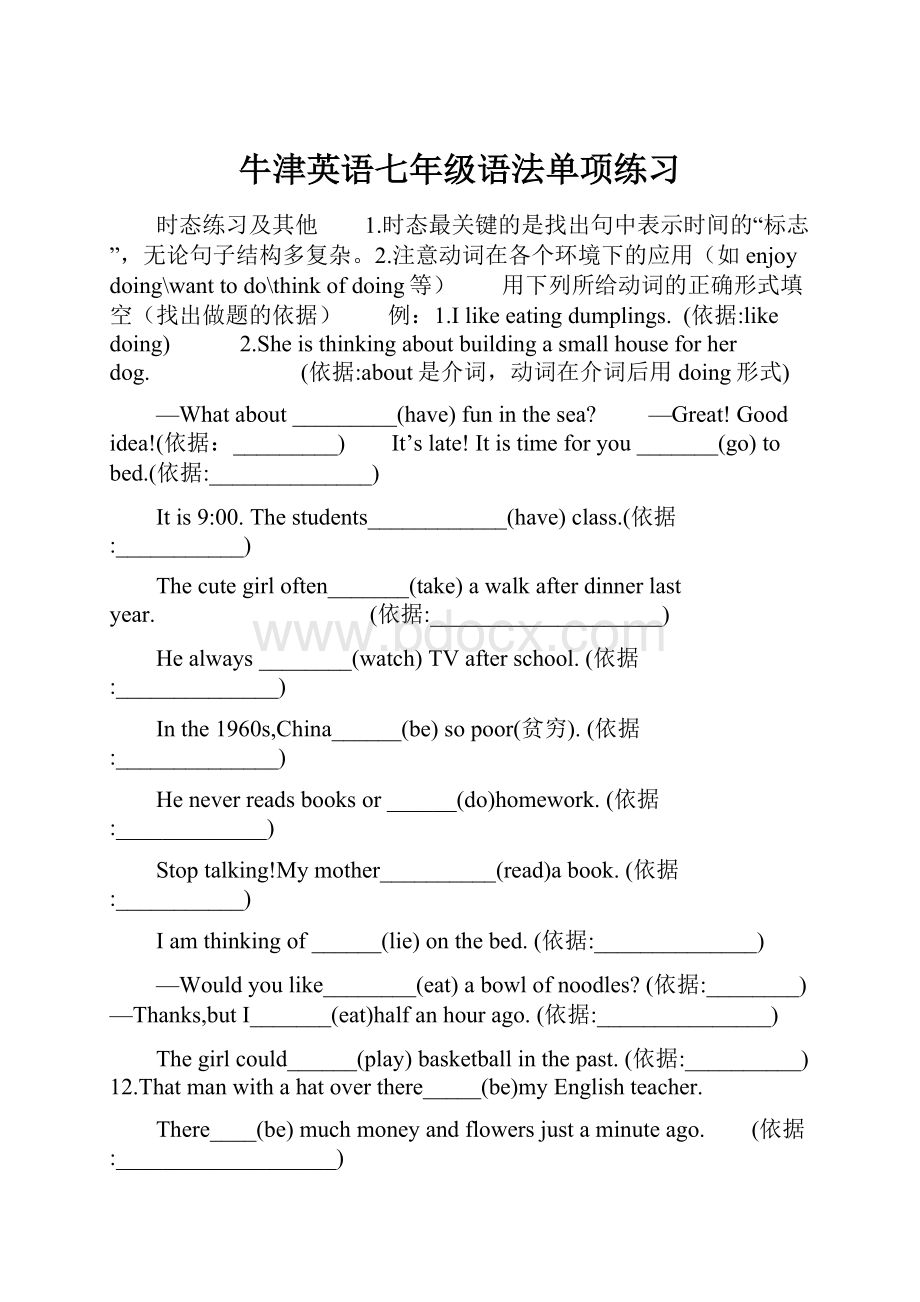牛津英语七年级语法单项练习.docx
《牛津英语七年级语法单项练习.docx》由会员分享,可在线阅读,更多相关《牛津英语七年级语法单项练习.docx(37页珍藏版)》请在冰豆网上搜索。

牛津英语七年级语法单项练习
时态练习及其他 1.时态最关键的是找出句中表示时间的“标志”,无论句子结构多复杂。
2.注意动词在各个环境下的应用(如enjoydoing\wanttodo\thinkofdoing等) 用下列所给动词的正确形式填空(找出做题的依据) 例:
1.Ilikeeatingdumplings. (依据:
likedoing) 2.Sheisthinkingaboutbuildingasmallhouseforherdog. (依据:
about是介词,动词在介词后用doing形式)
—Whatabout_________(have)funinthesea?
—Great!
Goodidea!
(依据:
_________) It’slate!
Itistimeforyou_______(go)tobed.(依据:
______________)
Itis9:
00.Thestudents____________(have)class.(依据:
___________)
Thecutegirloften_______(take)awalkafterdinnerlastyear. (依据:
____________________)
Healways________(watch)TVafterschool.(依据:
______________)
Inthe1960s,China______(be)sopoor(贫穷).(依据:
______________)
Heneverreadsbooksor______(do)homework.(依据:
_____________)
Stoptalking!
Mymother__________(read)abook.(依据:
___________)
Iamthinkingof______(lie)onthebed.(依据:
______________)
—Wouldyoulike________(eat)abowlofnoodles?
(依据:
________) —Thanks,butI_______(eat)halfanhourago.(依据:
_______________)
Thegirlcould______(play)basketballinthepast.(依据:
__________) 12.Thatmanwithahatoverthere_____(be)myEnglishteacher.
There____(be)muchmoneyandflowersjustaminuteago. (依据:
___________________)
Yesterdayhehelpedtheoldwoman______(bring)theheavyboxto8thfloor.(依据:
_________________)
Hishair______(be)blonde,butnowitisblack.
Ricewithnoodles_______(be)mainfood(主食).(依据:
__________) 17._____(let)usplayagamenow!
(依据:
______________)
Thesun_______(rise(升起))fromeast(东边).(依据:
_____________) 19.Everydaytheman_______(run)intheparkbeforehedied(死亡). (依据:
___________________)
Iremembershe_______(look)likehermotherwhenshewas5,butnowshe______(be)
tisgreatforme_______(have)lunchinKFC.(依据:
____________)
Themanreadabookand________(see)afilm. (依据:
____________________________)
1.答案 1.having 2.togo 3.arehaving4.took5.watches6.was7.does8.lying9.isreading 10.toeat;ate 11.play 12.is 13.was 14.bring 15.was 16.is 17.Let 18.rises 19.ran 20.looked;is 21.tohave 22.saw
一般将来时:
will+动词原形,shall+动词原形(但只能用于we/I第一人称)
is/am/aregoingto+动词原形
定义:
一般将来时表示将来某一时刻的动作或状态,或将来某一段时间内经常的动作或状态。
常常和表示将来的时间状语连用。
如:
tomorrow(明天),nextweek(下周),fromnowon(从现在开始);inthefuture(将来)等。
一般将来时由助动词shall(第一人称),will(第二、三人称)动词原形构成。
shall和will常常缩写成'll,紧接在主语之后。
其否定式shallnot和willnot的缩写式分别为shan't和won't。
()1.There__________ameetingtomorrowafternoon.
A.willbegoingtoB.willgoingtobeC.isgoingtobeD.willgotobe
()2.Charlie________herenextmonth.
A.isn’tworkingB.doesn’tworkingC.isn’tgoingtoworkingD.won’twork
()3.He________verybusythisweek,he________freenextweek.
A.willbe;isB.is;isC.willbe;willbeD.is;willbe
()4.There________adolphinshowinthezootomorrowevening.
A.wasB.isgoingtohaveC.willhaveD.isgoingtobe
()5.–________you________freetomorrow?
–No.I________freethedayaftertomorrow.
A.Are;goingto;willB.Are;goingtobe;willC.Are;goingto;willbeD.Are;goingtobe;willbe
()6.Mother________meanicepresentonmynextbirthday.
A.willgivesB.willgiveC.givesD.give
()7.–ShallIbuyacupofteaforyou?
–________.(不,不要。
)
A.No,youwon’t.B.No,youaren’t.C.No,pleasedon’t.D.No,please.
()8.–Whereisthemorningpaper?
–I________ifforyouatonce.
A.getB.amgettingC.togetD.willget
()9.________aconcertnextSaturday?
A.TherewillbeB.WilltherebeC.TherecanbeD.Thereare
()10.Iftheycome,we________ameeting.
A.haveB.willhaveC.hadD.wouldhave
()11.He________herabeautifulhatonhernextbirthday.
A.givesB.gaveC.willgivingD.isgoingtogiving
()12.He________tousassoonashegetsthere.
A.writesB.haswrittenC.willwriteD.wrote
()13.He________inthreedays.
A.comingbackB.camebackC.willcomebackD.isgoingtocomingback
()14.Ifit________tomorrow,we’llgoroller-skating.
A.isn’trainB.won’trainC.doesn’trainD.doesn’tfine
()15.He________thereattentomorrowmorning.A.willB.isC.willbeD.be
()16.Thetrain________at11A.goingtoarriveB.willbearriveC.isgoingtoD.isarriving
用所给动词的一般将来时填空
1.I______(leave)inaminute.I______(finish)allmyworkbeforeI______(leave).
2.—Howlong_____you_____(study)inourcountry?
—I_____(plan)tobehereforaboutonemoreyear.
—I_____(hope)tovisittheotherpartsofyourcountry.—What______you______(do)afteryou______(leave)here?
—I______(return)homeand______(get)ajob.
3.I______(be)tired.I______(go)tobedearlytonight.
4.Mary’sbirthdayisnextMonday,hermother_____(give)herapresent.
5.Itisverycoldthesedays.It______(snow)soon.
6.—_____you_____(be)herethisSaturday?
—No.I______(visit)myteacher.
7.—______I______(get)youacopyoftoday’snewspaper?
—Thankyou.
8.Iamafraidthere______(be)ameetingthisafternoon.Ican’tjoinyou.
9.Mike______(believe,not)thisuntilhe______(see)itwithhisowneyes.
10.Mostofusdon’tthinktheirteam______(win).
一般过去时
含义:
(1)表示在过去某个时间里所发生的动作或存在的状态.时间状语有:
yesterday,yesterdaymorning,yesterdayafternoon,thedaybeforeyesterday,lastnight,lastmonth,lamomentago,justnow,twodaysago,aweekago,in1990.......
(2)表示表示在过去的一段时间内,经常性或习惯性的动作。
WhenIwasachild,Ioftenplayedfootballinthestreet.
Myfatheroftendrovetoworklastyear.
结构:
(1)在表示某个时间里存在的状态的句子,系动词用was,were构成。
Iwasathomeyesterday.Wewereinthegymjustnow.
(2)在表示过去某个时间里发生的动作,用动词的过去式构成。
Ivisitedmyuncleyesterday.
(3)一般过去时的肯定陈述句:
主语+动词过去式+宾语或表语HeworkedinShanghaitenyearsago.
动词过去式的构成规律:
1.一般情况下,在动词原形后面加ed;2.以不发音e结尾的动词,在词尾直接加d;3.以辅音字母加y结尾的把y变ij加ed;
不规则的:
1.改变动词中的元音(begin,drink,come,eat,grow,run,know,win,speak,take,write,get
1.It_____(be)the2ndofNovemberyesterday.
MrWhite________(go)tohisofficebycar.
2.GaoShan________(put)thebookonhisheadamomentago.
3.Don't______thehouse.Mum_______ityesterday.(clean)
4.What____you______justnow?
I_______somehousework.(do)
5.They_________(make)akiteaweekago.
6.Iwantto______apples.Butmydad_______allofthemlastmonth.(pick)
7._______he______theflowersthismorning?
Yes,he_____.(water)
8.She____(be)aprettygirl.Look,she_____(do)Chinesedances.
9.Thestudentsoften_________(draw)somepicturesintheartroom.
10.What______Mikedoonthefarm?
He________cows.(milk)11.He_________(live)inWuxitwoyearsago.
12.Thecat________(eat)abirdlastnight.13.We_______(have)apartylastHalloween.
14.Nancy________(pick)uporangesonthefarmlastweek.15.I________(make)amodelshipwithMikeyesterday.
16.They_______(play)chessintheclassroomlastPElesson.17.Mymother_______(cook)anicefoodlastSpringFestival.
18.Thegirls________(sing)and_______(dance)attheparty.19.______he_______(fly)akiteonSunday?
Yes,he______.
20.GaoShan_______(pull)upcarrotslastNationalDayholiday.
21.I____________(sweep)theflooryesterday,butmymother______.
22.What______she_______(find)inthegardenlastmorning?
She__________(find)abeautifulbutterfly.
23.我的故事书刚才还在手表旁边。
Mystorybook_______besidethewatch_____________.
24.他们的外套上个礼拜放在卧室里了。
Their________________inthebedroom_________________.
25.一会以前花园里有两只小鸟。
There_________two_________inthegarden__________________________.
现在完成时态
现在完成时态的概念
结构形式
1表示在过去不确定的时间里发生过或者未发生过的动作对现在产生的响。
表示开始于过去的动作最近刚结束.
(表示“影响结束”)
A现在完成时的肯定句
主语(第一、二人称单、复数)+have
主语(第三人称单数)+has+过去分词
主语(第三人称复数)+have
B现在完成时的否定句
主句+have/has+not+过去分词
C现在完成时的一般疑问句
Have/Has+主语+过去分词
D现在完成时的特殊疑问句
特殊疑问句+have/has+主语+过去分词
2表示过去开始,持续到现在,而且还可能继续下去的动作或状态。
常与表示一段时间的状语连用。
(表示“继续”)
现在完成时态1的句型:
时间状语:
(already,just,ever,never,before,since,yet,once)
alreadyjust用于肯定句
never/yet用于否定句疑问句
ever用于肯定句和疑问句
A现在完成时的肯定句
IhaveeverboughtlotsofbooksaboutWesterncustoms.
HehaseverbeentotheGreatWallalready
Theyhaveseenthefilmalready.
B现在完成时的否定句
TheSamhaveneverbeentoCanadasincethedaytheyleft.
Erichasn'tgothisair-ticketsyet.
C现在完成时的一般疑问句
Haveyoueverreadthemagazines?
Yes,Ihave.
No,Ihaven't.
HashekilledSnowWhiteyet?
Yes,hehas.
No,hehasn't.
D现在完成时的特殊疑问句
Howlonghaveyoubeenhere?
HowmanytimeshaveyoubeentotheGreatWall?
Whichbookhaveyouread?
现在完成时态2句型:
A表示过去开始,持续到现在,而且还可能继续下去的动作或状态。
常和表示一段时间的状语连用。
thisweek/monthlatelyinthepastfewdays
thesedayssinceduringthelasttwoweeks
sincethensince2daysagoSofarforalongtime
uptonowtill/untilnow
1I'veknownhimsincemychildhood.
2Shehasbeeninthisschoolsince2007.
3HehaslivedinBeijingfor3years.
4Ihavestayedinthehotelfortwoweekssofar.
B表示从过去到现在之间曾经历过的事情。
常和以下的词连用。
oftennevereveroncetwicesincebeforethreetimes
Hehasneverillinhislife.
IhavebeentotheSummerPalacetwice.
Wehavevisitedyourschoolbefore.
使用现在完成时态的注意事项
A现在完成时与一般过去时
现在完成时与一般过去时都表示在过去做的动作,但现在完成时强调这动作与现在的关系,如现在产生的结果、影响等。
而一般过去时则只表示过去的事实,不表示和现在的关系。
所以,一些表示过去固定时间的状语只能与一般过去时连用,而不能与现在完成时连用。
如句中有ago,last或有when引起的问句都不能与完成时连用。
现在完成时与一般过去时的区别举例
Ihavecleanedmyroomthreedaysago.×
Ihavecleanedmyroomthreedaysago.√
Ihavevisitedyourschoolbefore.√
Iboughtaredcar.(过去时)
Ihaveboughtaredcar.(现在完成时态)
Bwhen不能和现在完成时连用时连用
Whenhaveyouboughttheredcar?
×
Whendidyoubuytheredcar?
√
C关于终止性动词
终止性动词(也叫点动词)表示的动作有一个终点,到了终点就不能在延续。
因此在现在完成时中,这种动词不能与表示延续的时间状语连用。
常用的终止性动词有:
(arrivebeginborrowbuycomedie